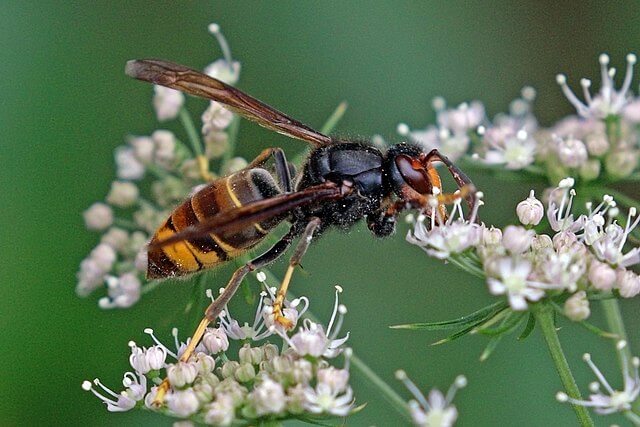
The UK faces a potential crisis as Asian hornets, a perilous threat to bee populations, may have established themselves following the earliest sighting ever recorded by the government this month.
This development poses a significant risk to agriculture, heavily reliant on bees for pollination, as once these hornets gain a foothold, eradicating them becomes exceedingly challenging.
Asian hornets, scientifically known as Vespa velutina, pose a grave danger to bees. In France, where they’ve proliferated, concerns have mounted over their devastating impact on insect populations.
These predators lurk near honeybee hives, ambushing bees as they come and go. They dismantle their prey, feeding the thoraxes to their offspring. Remarkably, a single Asian hornet can consume 30 to 50 honeybees in a single day.
Confirmation of an Asian hornet sighting in Ash, Kent, on March 11th, marks a troubling turn. The hornet’s identity was verified through laboratory testing conducted by the Department for Environment, Food and Rural Affairs (DEFRA). The early appearance suggests the possibility of overwintering, indicating a potentially established presence in the UK.
Diane Drinkwater, the chair of the British Beekeepers’ Association, said: “I suspect this is a winter queen that was born here. That has not been confirmed, but that would be logical.
“Their life cycle is not advanced enough for them to have developed workers by this point. So I suspect it has not migrated from abroad, but we may have missed a nest somewhere. We have seen a lot of rain so a lot of places where they hibernate might have been flooded. We always hope to see a lot of them die off.”
Alarmingly, Asian hornet sightings in the UK have surged, reaching 57 in 2023—more than double the cumulative sightings of the preceding seven years. These invasive insects first infiltrated Europe in 2004, likely hitchhiking on cargo from Asia. Rapid expansion ensued, culminating in their arrival in Britain after crossing the English Channel.
David Smith from the invertebrate charity Buglife said: “It would seem increasingly likely that they [the hornets] have overwintered given the number of records last year and nests found right through until November. We have had a relatively mild winter so travel by their own means from the continent would still be possible, and there are also open pathways via imported natural goods such as plants, soils, and timber.”
He added: “It is highly concerning that their ‘season’ appears to be getting longer and this is a real risk to wild pollinators that are already facing significant declines and are now faced with a ferocious predator as they are emerging from winter.”
Experts have raised concerns about post-Brexit trade regulations facilitating the hornets’ colonisation. While the EU has banned soil imports in potted plants from the UK post-Brexit, a reciprocal ban is absent in the UK. Consequently, invasive species like the Asian hornet could infiltrate British soil, posing a grave threat to native ecosystems.
Distinctive features, including orange faces, yellow-tipped legs, and darker abdomens, distinguish Asian hornets from their native counterparts. The initial UK sighting occurred in Tetbury, Gloucestershire, in September 2016, signifying the inception of a formidable ecological challenge.
Efforts to mitigate this menace demand urgent action. Enhanced surveillance, public awareness campaigns, and stringent trade regulations are imperative to prevent further spread and safeguard vulnerable bee populations and agricultural ecosystems from the pernicious impact of Asian hornets.
——————————————————————————
At Natural World Fund, we are passionate about stopping the decline in our wildlife.
The decline in our wildlife is shocking and frightening. Without much more support, many of the animals we know and love will continue in their decline towards extinction.
When you help to restore a patch of degraded land through rewilding to forests, meadows, or wetlands, you have a massive impact on the biodiversity at a local level. You give animals a home and food that they otherwise would not have had, and it has a positive snowball effect on the food chain.
We are convinced that this is much better for the UK than growing lots of fast-growing coniferous trees, solely to remove carbon, that don’t actually help our animals to thrive.
This is why we stand for restoring nature in the UK through responsible rewilding. For us, it is the right thing to do. Let’s do what’s right for nature!
Donate today at https://naturalworldfund.com/ and join in the solution!

